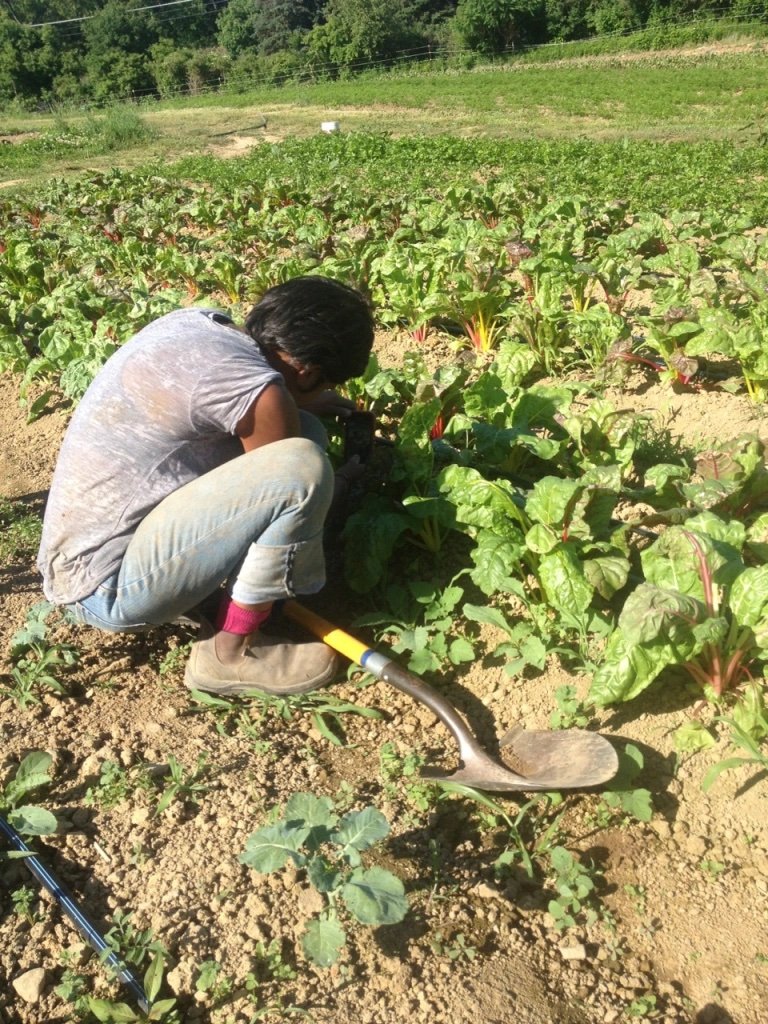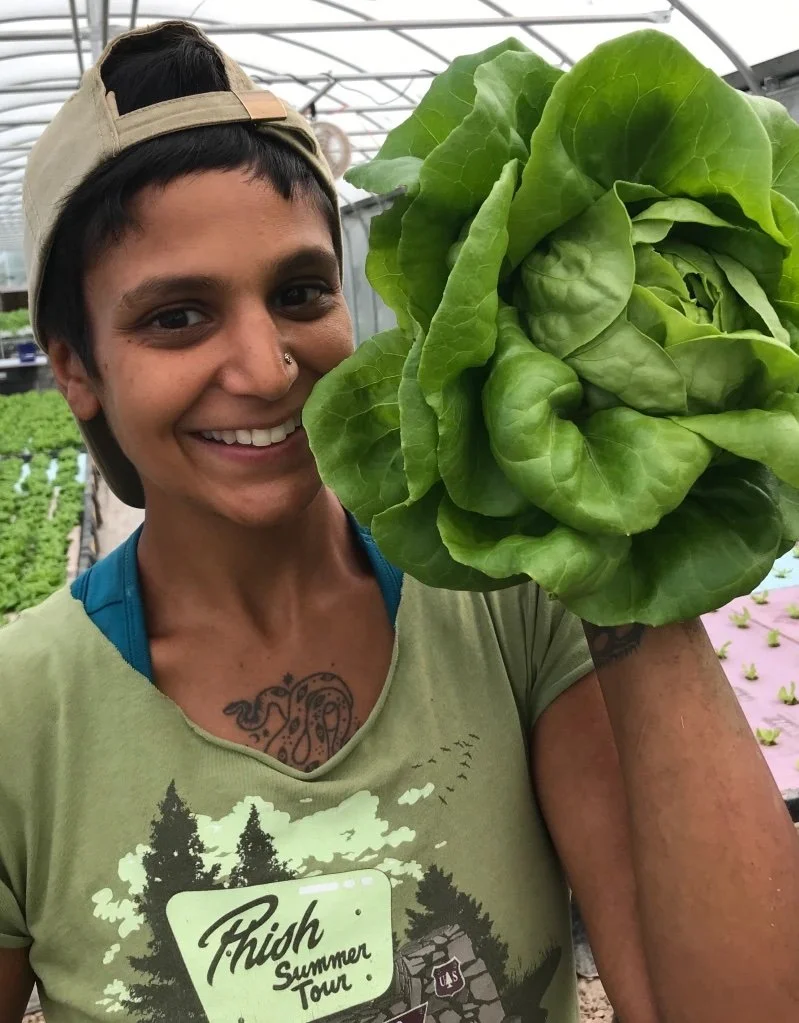ANITA ADALJA
Anita founded Not Our Farm in December of 2019.
WHAT INITIALLY BROUGHT YOU TO THE FIELDS?
I was working in social work and supported housing in Brooklyn, New York back in 2007/2008. It was housing for chronically unhoused and “mentally ill” people. I had just finished/dropped out of a graduate program and was feeling in over my head, when my co-worker and I decided to start a rooftop garden for the residents of the building where we worked. We honestly were just finding excuses for being on the roof and looking at the NYC skyline. We were 25 and totally in over our heads, unsure of what we were doing and trying to find our path.
We didn’t have funding, but we did have old, used wooden bed frames, which turned out to be perfect raised beds. They were stored in the basement and were actually the old bed frames from residents who had passed away. The building had an elevator so we were able to transport them and soil up onto the roof. The rest was history for me and I’ve been farming ever since.
I left Brooklyn and went to the Center for Agroecology and Sustainable Food Systems (CASFS) at UC Santa Cruz in 2011 to learn organic farming and then went on to farm in Washington, DC, Virginia, Pennsylvania, and New Mexico on for-profit, non-profit, urban and rural farms ranging from 1/2 acre to 30 acres and have held positions of apprentice, crew member, field manager, and farm manager.
WHY HAVE YOU CHOSEN TO FARM FOR SOMEONE ELSE (NOW OR IN THE PAST?)
I never had goals of starting my own farm. I am in constant search of a farm where I can call my home and be part of the crew, but all of my farm experiences have been sprinkled (or dumped on) with sexism, racism, classism, and sorts of abuses, and often really really unreasonable or unsustainable work expectations.
WHAT ARE SOME ISSUES FOR FARMERS WORKING ON SOMEONE ELSE'S FARM - ISSUES THAT YOU'VE WITNESSED OR EXPERIENCED?
It’s really problematic when owners do not recognize your skills or experiences. I’ve had farming experiences where the owner refused to acknowledge that I had been farming for nearly as long as him, and would regularly try to teach me about pretty basic things, like how to use a coupler.
I’ve also had experiences where I was the farm manager, but the owner was threatened by my skills and rapport with the crew and would undermine me (by speaking over me, asking the crew to do another task after I had started the crew on something else, you get the picture).
As a brown woman, I am always the last person that visitors come up to when they have a question or if they are looking for someone in charge. It’s been especially challenging for me when I’ve managed farms and visitors assume first-time volunteers (always white people, usually men) are the managers and cannot hide the surprise on their face when they are redirected to me.
I’ve worked for a female farm owner who have reprimanded me for asking for assistance in lifting something that was too heavy for me, saying that we can’t show signs of weakness to anyone. It was clear she was dealing with her own issues being in a male-dominated space and was projecting that onto me and the rest of the crew.
I’ve also had to work on farms that were openly racist, owners expecting me to live in a trailer park that was splattered with confederate flags and not understand why I was uncomfortable. I asked the farm owner if she ever had non-white people working on her farm (before me) and she mentioned that she had a very tan Italian woman work for her before who never had issues with racism in the trailer park. I’ve been gaslighted by owners when I talked about coworkers using racial slurs.
The lack of bathrooms on farms in so problematic. It’s the norm on smalls farms where I’ve worked that we have to poop and pee around the farm and not have access to hand washing stations. I worked on a farm where the farm owner was allowed to use the land owner’s bathroom in her house, but the crew wasn’t allowed. She put a portapotty on one of the farm sites (we had 4 fields) and never had it cleaned, not once in 9 months!! Obviously we never used it because it was a toxic waste hazard full of shit and black widows.
It’s hard when HR on farms is actually the owners of the farm. It puts you in an uncomfortable, unsafe position right from the start.
CAN YOU TELL ME THE QUALITIES OF A DREAM FARM NOT LEADING TO OWNERSHIP - THAT YOU WOULD WANT TO WORK ON?
I want to work on a farm where everyone is part of the planning and operation of the farm. Where everyone has a say in the work, and knowledge of the farming operation isn’t kept as currency, and given out in little segments to make you feel special.
I want to work on a farm that feels safe, where it’s stated and enforced that racism, sexism, and classism is not tolerated. When you are working as hard as you do on a farm, day in and day out, everyone needs to be treated as a human (who has the same needs as the owners) and with respect.
“If I’m not on a farm, I’m trying to get back on a farm. My identity is so intertwined with farming. I’m not sure if that’s healthy or not, but I don’t really know who I am if I’m not farming. I feel like I have spent multiple lifetimes farming, like each farm is a different life. I have worked through tough stuff in the fields and left pieces of myself everywhere I’ve worked.”
WHAT KEEPS YOU COMING BACK?
If I’m not on a farm, I’m trying to get back on a farm. My identity is so intertwined with farming, maybe that’s not healthy, but I don’t know who I am if I’m not farming. For my entire life, I have felt suspended between two universes, the Indian universe and the American universe, not quite sure if or where I belong. But with farming I feel purpose, joy, comfort, and security that comes with alignment with the land and the natural world. Plants and animals have welcomed me as kin when my family and community has rejected me or felt afraid of me for my brownness or queerness. I’ve learned to mother and be mothered by plants and animals and the earth, while my own maternal blood relatives have been unable to offer that to me because of their own generational trauma.
And plants are such a thrill to me. Squash seedlings bursting out of the soil like an earthquake never ceases to amaze me. I like that every season is another opportunity to try again.
I love seeing the symphony of the sunrise every morning. It feels like I’m in on a secret.
ANYTHING ELSE YOU'D LIKE TO SHARE ABOUT YOURSELF & YOUR RELATIONSHIP WITH FARMING? WHAT KEEPS YOU UP AT NIGHT?
I feel like I have spent multiple lifetimes farming. I have worked through trauma, relationships, anxiety and depression in the fields and left pieces of myself everywhere I’ve worked. Blood, sweat and tears is real.




